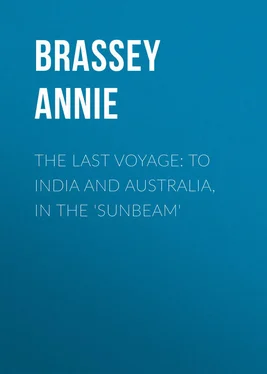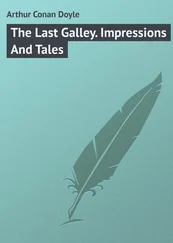Annie Brassey - The Last Voyage - To India and Australia, in the 'Sunbeam'
Здесь есть возможность читать онлайн «Annie Brassey - The Last Voyage - To India and Australia, in the 'Sunbeam'» — ознакомительный отрывок электронной книги совершенно бесплатно, а после прочтения отрывка купить полную версию. В некоторых случаях можно слушать аудио, скачать через торрент в формате fb2 и присутствует краткое содержание. ISBN: , Издательство: Иностранный паблик, Жанр: foreign_antique, foreign_prose, на английском языке. Описание произведения, (предисловие) а так же отзывы посетителей доступны на портале библиотеки ЛибКат.
- Название:The Last Voyage: To India and Australia, in the 'Sunbeam'
- Автор:
- Издательство:Иностранный паблик
- Жанр:
- Год:неизвестен
- ISBN:http://www.gutenberg.org/ebooks/29778
- Рейтинг книги:3 / 5. Голосов: 1
-
Избранное:Добавить в избранное
- Отзывы:
-
Ваша оценка:
- 60
- 1
- 2
- 3
- 4
- 5
The Last Voyage: To India and Australia, in the 'Sunbeam': краткое содержание, описание и аннотация
Предлагаем к чтению аннотацию, описание, краткое содержание или предисловие (зависит от того, что написал сам автор книги «The Last Voyage: To India and Australia, in the 'Sunbeam'»). Если вы не нашли необходимую информацию о книге — напишите в комментариях, мы постараемся отыскать её.
The Last Voyage: To India and Australia, in the 'Sunbeam' — читать онлайн ознакомительный отрывок
Ниже представлен текст книги, разбитый по страницам. Система сохранения места последней прочитанной страницы, позволяет с удобством читать онлайн бесплатно книгу «The Last Voyage: To India and Australia, in the 'Sunbeam'», без необходимости каждый раз заново искать на чём Вы остановились. Поставьте закладку, и сможете в любой момент перейти на страницу, на которой закончили чтение.
Интервал:
Закладка:
The truest testimony to your mother's worth is to be found in the painful void created in the home circle by her death. For me the loss must be irreparable. It would, indeed, be more than we could bear, if we had no hope for the future. We cling to that hope; and whatever our hand findeth to do, we must, like her, try to do it with all our might.
Such then was your dear mother: a constant worker, working it may be beyond her strength, yet according to the light which God had given her, and in the noblest causes. Your mother was always doing good to those from whom she had no hope to receive. She did not do her alms before men: not those at least which cost her most in time and in thought. When she prayed, she entered into her closet and shut the door, and, without vain repetition, presented her heart's desire in language most simple before the Father in Heaven. Her life was passed in the spirit of the Apostle's exhortation: 'Be ye kind one to another, tender-hearted, forgiving one another.'
In the last prayer which she was able to articulate with me, your mother besought the blessing of Heaven upon us both, praying that she might yet be spared to be a comfort to me and all around her. In that prayer was embodied the central aim of her existence. Her praise to God was sung in her work of practical good. Her psalm was the generous sacrifice of self to works which she believed would be for the advantage of others. This thoughtfulness was shown in the most beautiful way, when the last sad call had come. When, in reply to her touching inquiry, 'Is it quite hopeless?' the answer gave no encouragement to hope, you will not forget the tenderness, the unfaltering fortitude, with which she bestowed her blessing, and then proceeded, until articulation was denied, to distribute to each some token of her tender love. She died in perfect charity with all, sweetly submissive to the Divine Will, and consoling her afflicted husband and children to the very last.
Your mother's heart was as large as it was tender. She was devoted, as a wife, to her husband; as a mother, to her children. She was kind to dependents, ever thoughtful for the poor, and there was a large place in her heart for her dumb companions. Her presence will, I am sure, never fade from your recollection; and in all my remembrance of her I can recall no period of her life when her face was so dear to look upon as in the days after leaving Port Darwin. As she lay back on her pillows, a veil of white lace thrown round her head, her eyes so bright, her smiles so loving, not a murmur from her lips nor a shade of unrest on her serene countenance, the peculiar sweetness of her expression seemed a foretaste of the peace of heaven.
I do not recall these things solely as a tribute to the dear one who has passed away from among us, but for your profit and for mine. We have seen how your mother used her opportunities to make the world a little better than she found it. We may each do the same service in our own sphere, and so may best be followers of her good example. In tenderest love may we ever cherish and bless and revere her memory.
My dear children, I might write more. I could never tell you what your mother was to me.
Your very affectionate father, Brassey.'Sunbeam,' R.Y.S.: September 1887.
INTRODUCTORY CHAPTER
WHEN the arrangements for a contemplated cruise to the East were being considered, towards the end of 1886, it was thought best for Lady Brassey and her daughters to make the voyage to Bombay in a P. & O. steamer. The 'Sunbeam' herself was to sail from Portsmouth by the middle of November. Lord Brassey, in the first paragraph of his 'Sunbeam Papers,' thus acknowledges the help he derived at starting, in what may be called the domestic department of the yacht, from Lady Brassey's presence on board for even a few hours.
'We embarked at Portsmouth on Monday, November 16th. The "Sunbeam" was in hopeless confusion, and it required no ordinary effort of determination and organisation to clear out of harbour on the following day. A few hours at Southampton did wonders in evolving order out of chaos. On the afternoon of November 18th, my wife and eldest daughter, who had come down to help in preparing for sea, returned to the shore, and the "Sunbeam" proceeded immediately down Channel.'
At Plymouth Lord Brassey was joined by the late Lord Dalhousie and by Mr. Arnold Morley, M.P. The former landed at Gibraltar, and the latter at Algiers. Through the long voyage to Bombay the gallant little yacht held stoutly on her course, meeting first a mistral in the Mediterranean, then strong head-winds in the Red Sea, and having the N.E. monsoon in her teeth after leaving Aden.
In the meantime Lady Brassey, her three daughters, and some friends left England a few days after the yacht had sailed, travelling slowly, with many interesting stopping-places, and not finally reaching Brindisi until December 11th. Thence to Egypt was but a brief voyage, and the one day's rest (!) at Alexandria was devoted, as usual, by Lady Brassey to visits – so minute in their careful examination into existing conditions as to be more an inspection than the cursory call of a passing traveller – to the Soldiers and Sailors' Institute, and also to the Military Hospital at Ramleh. Arrangements had next to be made for the disposal of stores sent out by the Princess of Wales' branch of the National Aid Society; and all this constituted what may fairly be considered a hard day's work. Then came a well-occupied week in Cairo, where much hospital-visiting was again got through, and many interviews respecting the site for the new hospital at Port Said were held with the Egyptian authorities. This pleasant but by no means idle dawdling brought the party to Suez on December 23rd, where they embarked at once on board the P. & O. steamer 'Thames,' Captain Seaton, and started at midnight for Bombay.
Carefully and well had the plans for both voyages been laid, and successfully – by grace of wind and weather – had they been carried out. On January 3rd, 1887, Lord Brassey in the 'Sunbeam' and Lady Brassey in the 'Thames' exchanged cordial signals of greeting off the harbour of Bombay. The incident must be briefly described from the earlier 'Sunbeam Papers' (for of this first portion of the cruise Lady Brassey has unhappily left no notes). 'As we were becalmed off Bombay, waiting for the sea breeze which invariably freshens towards noon, the Peninsular and Oriental Company's steamship "Thames," with my wife and children on board, passed ahead of us into the harbour. We had a delightful meeting in the afternoon at Government House, Malabar Point, where we were greeted with a most cordial welcome from our dear friends Lord and Lady Reay.'
We are so accustomed nowadays to the punctual keeping of appointments made months before, with half the width of the world between the meeting-places, that this happy and fortunate coincidence will scarcely excite remark, even when the home journal dwells on the added joy of the arrival, that very same evening, as planned beforehand, of Lord Brassey's son, who had started earliest, and had been spending some weeks of travel, sight-seeing, and sport, pleasantly combined, in Ceylon and Southern India.
The punctuality of the P. & O. steamers might be a proverb, if in these hurried days anyone ever paused to make a proverb; and therefore it is not the rapid run of the 'Thames' which excites our admiration. It is rather the capital sailing qualities, well tried and proven as they are, of the 'Sunbeam.' Though essentially a sailing vessel and carrying very little coal, the yacht had made her way through the intricate navigation of the Red Sea and against the strong contrary winds of the N.E. monsoon, which blew with quite exceptional force off the southern shores of Arabia, and had finally dropped anchor at the appointed day, and almost hour, in Bombay Harbour.
Читать дальшеИнтервал:
Закладка:
Похожие книги на «The Last Voyage: To India and Australia, in the 'Sunbeam'»
Представляем Вашему вниманию похожие книги на «The Last Voyage: To India and Australia, in the 'Sunbeam'» списком для выбора. Мы отобрали схожую по названию и смыслу литературу в надежде предоставить читателям больше вариантов отыскать новые, интересные, ещё непрочитанные произведения.
Обсуждение, отзывы о книге «The Last Voyage: To India and Australia, in the 'Sunbeam'» и просто собственные мнения читателей. Оставьте ваши комментарии, напишите, что Вы думаете о произведении, его смысле или главных героях. Укажите что конкретно понравилось, а что нет, и почему Вы так считаете.









![John Bruce - The Lettsomian Lectures on Diseases and Disorders of the Heart and Arteries in Middle and Advanced Life [1900-1901]](/books/749387/john-bruce-the-lettsomian-lectures-on-diseases-and-disorders-of-the-heart-and-arteries-in-middle-and-advanced-life-1900-1901-thumb.webp)


